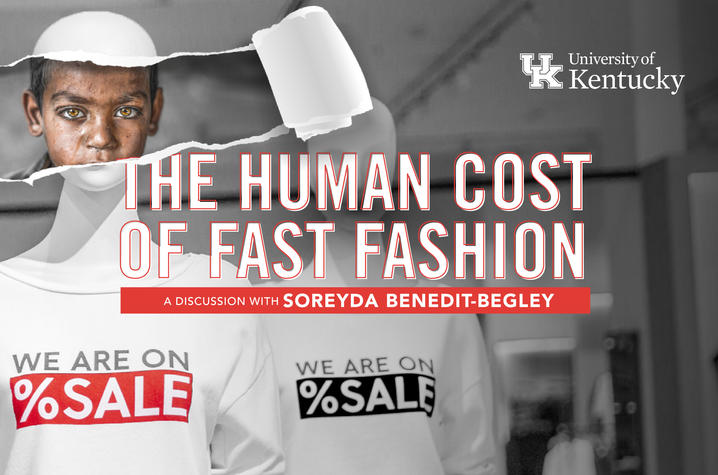UK to Host ‘The Human Cost of Fast Fashion’ With Local Designer Soreyda Benedit-Begley
LEXINGTON, Ky. (Jan. 29, 2021) — Around the globe, fashion brands are known to quickly create inexpensive garments to meet ever-changing trends. This practice known as “fast fashion” has been largely welcomed by budget-conscious consumers.
However, as sustainability and social justice become emerging mainstream values, buying patterns are beginning to shift. Now, some consumers question how textile industries impact developing nations — where nearly 90% of the world’s clothes are produced.
At 6:30 p.m. Wednesday, Feb. 3, the University of Kentucky Gaines Center for the Humanities and College of Agriculture, Food and Environment’s Merchandising, Apparel and Textiles program are hosting local fashion designer and activist Soreyda Benedit-Begley for a virtual discussion on “The Human Costs of Fast Fashion.”
Originally from Honduras, Benedit-Begley experienced the harsh reality of fast fashion while working in a sweatshop as a teenager. Today, she shares her creative skills and knowledge to advocate for workers’ rights, fair trade and sustainable development.
“My experience working in sweatshops defines my work as a designer,” Benedit-Begley said. “What I do isn’t just about making pretty clothes and organizing fashion shows for entertainment. I want people to experience the fashion industry up close and understand that it is complex, exciting and glamorous. But it also has created work conditions that can be considered nearly modern-day slavery.”
As Benedit-Begley also knows, problems within the fashion industry extend beyond sweatshops in developing countries.
“Despite the fact that fashion is predominantly female, with a workforce made up 70% of women, women in the fashion industry hold less than 25% of leadership positions in top fashion companies," she said.
Organizers hope to attract a diverse audience for the event and shed light on injustices occurring throughout the fashion industry.
“You don’t need to be a merchandising student to have a voice in this discussion,” said Vanessa Jackson, chair of the Department of Retailing and Tourism Management. “We all wear clothes, and therefore we all have a role to play.”
This virtual event is free and open to the public. To register, please visit the Eventbrite webpage.
“As consumers, we all have the ability to promote and create change. By supporting independent designers and makers, even if it’s by purchasing one item a year, we can make a difference,” said Benedit-Begley.
Founded in 1984 by a generous gift from John and Joan Gaines, the Gaines Center for the Humanities functions as a laboratory for imaginative and innovative education on UK's campus. The center is devoted to cultivating an appreciation of the humanities in its students and faculty. The Gaines Center embraces varied paths of knowledge and particularly strives to integrate creative work with traditional academic learning.
As the state’s flagship, land-grant institution, the University of Kentucky exists to advance the Commonwealth. We do that by preparing the next generation of leaders — placing students at the heart of everything we do — and transforming the lives of Kentuckians through education, research and creative work, service and health care. We pride ourselves on being a catalyst for breakthroughs and a force for healing, a place where ingenuity unfolds. It's all made possible by our people — visionaries, disruptors and pioneers — who make up 200 academic programs, a $476.5 million research and development enterprise and a world-class medical center, all on one campus.





